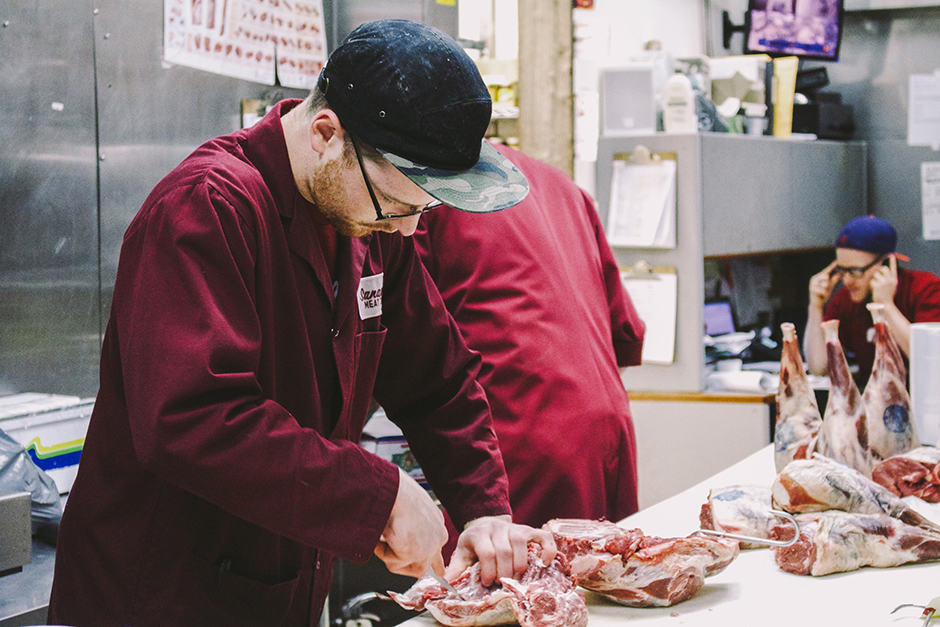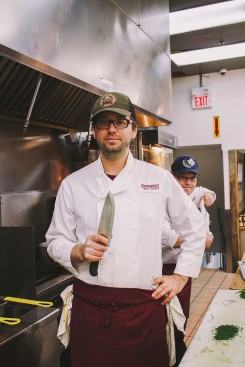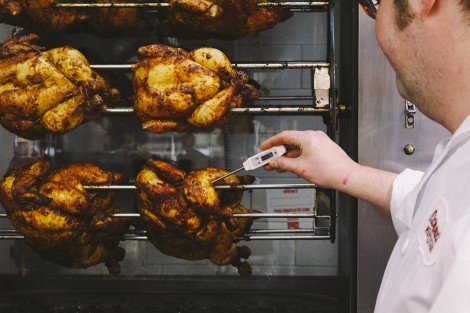A friend of mine, just out of culinary school, got a job managing a boutique grocery store making almost 50 grand a year (he took a $20,000 pay cut to work at the restaurant Canoe because he “missed the rush”). The average line cook is expected to produce dishes of consistent quality, incredibly quickly, almost 12 hours a day. The loud, fast-paced, demanding world of kitchen work is in stark contrast to the quiet, solitary work of a college student. Yet, many students in Toronto work as cooks to support themselves while in school. Three cooks, all of whom worked through college, found compliments, challenges, and outright contradictions in the life of a student cook.
DOUG
Doug Jones is a cook who started out at Milestones and worked his way to the kitchen of The Drake. He worked kitchen jobs through his two years at Ryerson University, working towards a degree in Computer Science. According to him, the shifts took a difficult toll on his academic life. Brunch shifts at The Drake, coveted by cooks looking for better hours, were typically 6:00 am to 5:00 pm. On a busy weekend he and one other line cook would hold down a 700-cover service.
Jobs like these weren’t much of a choice for Jones. He had moved away from home in high school and had to pay loans. Still, kitchens were so emotionally and physically demanding for him that maintaining a work ethic for school became increasingly difficult. Jones had a firm grounding in computer science — he’d been programming for fun since grade 9 — but he failed many of his classes simply because he couldn’t make it to his labs. While he worked hard on shift, his off time was used “basically to get high and work off hangovers.”
While his academics suffered, Jones, currently expanding his skills as a butcher, found a home in kitchens. Unlike school, he could “see the ladder clearly.” He was working right next to his bosses, learning from them, and putting those lessons to work immediately. He could see how a driven, hardworking cook could go far in the industry. Socially, the job offered a lot that he found was lacking in school. “Kitchens force you to socialize with people you’d never normally talk to,” he explains. Compared to the isolating experience of academia, the camaraderie of the kitchen held major appeal.
STEVE
Steve* is a working musician, with a kitchen résumé that includes restaurants such as the Gabardine. He held kitchen jobs throughout both his undergraduate and master’s degrees in music performance. Steve found in kitchens the perfect complement to his musical career. Both kitchens and bands, he says, are ensembles. Playing in a tight ensemble he can set his tempo off a bandmate’s breath. In the same way, a tight kitchen crew can coordinate a complicated table service with barely a word spoken. That feeling is much of what attracted Steve both to kitchens and music.
Even for Steve, however, kitchen work exacted its toll. While he was in school, he had “wanted any kind of music job, even if it was just in a store.” He ended up in a kitchen, mostly because that was the only thing on his résumé. Steve got his first job dishwashing after his parents caught him getting high. Ironically, at least according to him, he learned to drink properly while he was working. While on shift waiters and cooks would ply him with shots, and after work staff made a direct beeline to the nearest bar.
JOHN
John*, a cook at Sanagan’s Meat Locker in Kensington, got his first kitchen job after second year. “The next two years of school,” he says, “have taken me five.” Currently enrolled at U of T, John describes the self-destructive atmosphere of kitchen life. Few jobs can match the physical and mental stress of working in a kitchen — because of that, the kitchen lifestyle lends itself to substance abuse. In John’s experience, “the constant stress and persistent hangovers make school pretty tough.”
Despite “shit pay” and a damaging lifestyle, John, like his fellow student cooks, finds something deeply attractive about the work. Dealing with that level of intensity in the workplace makes more mundane jobs seem almost unbearably dull in comparison. Though the lifestyle has its detriments, John describes it as “pleasing.” Kitchens, he laughs, “are appealing to people who hate themselves.” Life as a student cook, though, has been hard to balance. The simple fact, according to John, is that “after a 12-hour shift on your feet, the very last thing you want to do is study.”
*Names changed by request.




